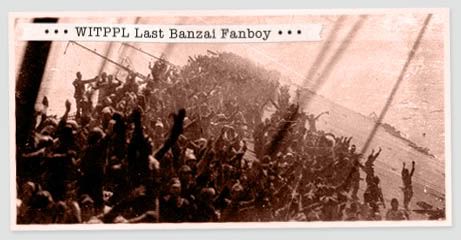WITPPL
Posts: 290
Joined: 8/5/2009
Status: offline

|
Some good point that leads me to this:
They were competent. They had no problems with transporting troops even in late 44 early 45 (internal lines) but...
TADA!
They had supply problems (since 30 ties). They had problems to keep supplied troops at Guadalcanal in 42 and later on ie Saipan.
SO,
They send as much as they could supply wise and HAD to keep rest of the army where it could be fed. Like fleet based close to a oil sites in Borneo and Sing.
For me, mystery SOLVED!
quote:
ORIGINAL: topeverest
WITPPL.,
good questions and comments.
History clearly documents that the Japanese high command kept most of their land forces on the HI. That is the strategy they played out. The leaders of the time never even conceived that a war could be lost as long as the home islands were held. Think about the history from 44. Their proposed solution was attrition warfare on their terms. Peililu, Iwo, and Okinawa. Japan was thinking armistic by destoying the allies willingness to continue the carnage, especially after the twin defeats in the Marianas and Philppines. For a relatively small land investment (other than Okinawa) they were very costly for the Americans and in many ways bolstered the idea that an armistic could be achieved as long as 'the next island' was more costly than the last. They did not plan on B29's and the atomic bomb. Japan planned on making the war too costly to pursue, but new technologies made that assumption false. They got caught in that classic hole of 'trying to fight the last war.' That is something that all players have fore-knowledge of...history...it is impossible to introduce that uncertainty into the game. There are no 'great' unknowns that can only exist during the actual prosecution of the war.
History also documents the widely held thought the war with America would be won quickly, which limited strategic investments in weaponry, tactics, and technology until it was too late. Japan just did not believe their navy could be defeated by the American navy. It was Nimitz who had the last laugh when he won or tied the five major Jap / American carrier clashes in 42. In 43, after Yamamoto was killed, the Japs continued their New Guinea / Rabaul / Truk fortification strategy as the jap navy rebuilt. There was no similar conecntration on the Marshalls. In fact, the fleet was posted at Truk or the Philippines, always at least a four day sprint to the Marshalls / gilberts to protect the resource routs and the Philippines. Because the Americans eventually controlled the skies and seas in New Guinea and Solomons, they could and did bypass the initial strongholds of Truk and Rabaul. This weighed heavily in Jap admirals and generals' thinking that so many troops were invalidated without a fight. There was a solid line of reasoning by mid 44 that troops placed in the home islands were far more effective and might actually be in the war! It was decided that the navy that would fight at the point of contact, as occured in the Mariana's. Unfortuantely for the Japanese, that battle was a disaster (and so were the ensuing Philipine naval battles), no other strategic options were available thereafter. The Americans already had the bases that would win the war, the Jap leadership just didnt believe it yet.
As far as the Jap bickering. Lets not forget the Macarthur / Nimitz skirmishes. Fundementally the major arguments they had were the same arguments had in Jap high command - who gets to control the war - the Navy or the Army. The real difference was the ability of the American president and the entire allied senior political command to control the bickering, choose their strategy, and prosecute their war. Japan had no similar political apparatus.
----------------
To your other point on what if / justification...Since few allied players will ever attempt to invade Japan-proper given the mix of available forces (there scaresly is a need), players justifably want to push out forces as far and as fast as possible while they still have assets to contest the seas. That is the beauty of the game. As Japan, you can play it just about any way you want. As an option to play out the war you hint at, you could set up a 'no Russia and no atomic bomb' scenario with relative ease. You can even set releases or PP's to activate these forces at a suitable time.
_____________________________

|
 Printable Version
Printable Version


















 (Rabaul, Truk, ...)
(Rabaul, Truk, ...)


 New Messages
New Messages No New Messages
No New Messages Hot Topic w/ New Messages
Hot Topic w/ New Messages Hot Topic w/o New Messages
Hot Topic w/o New Messages Locked w/ New Messages
Locked w/ New Messages Locked w/o New Messages
Locked w/o New Messages Post New Thread
Post New Thread